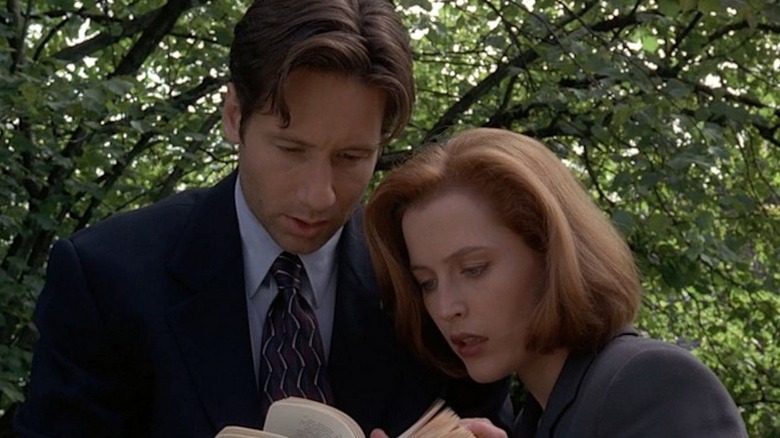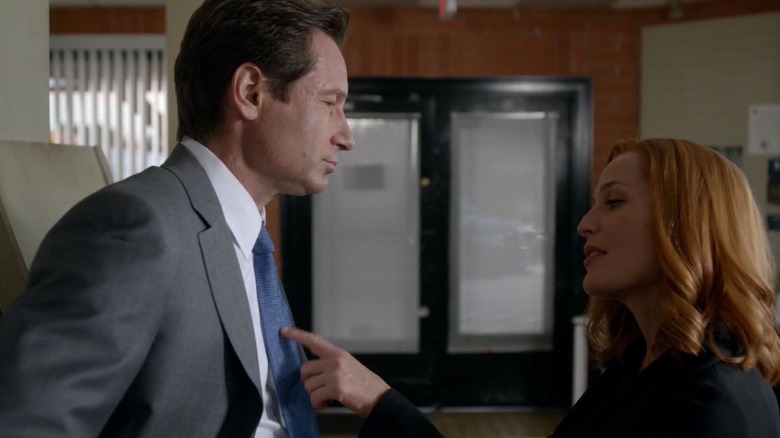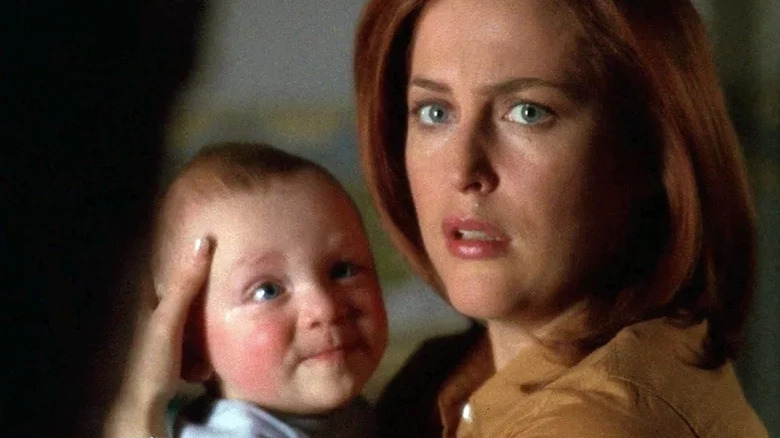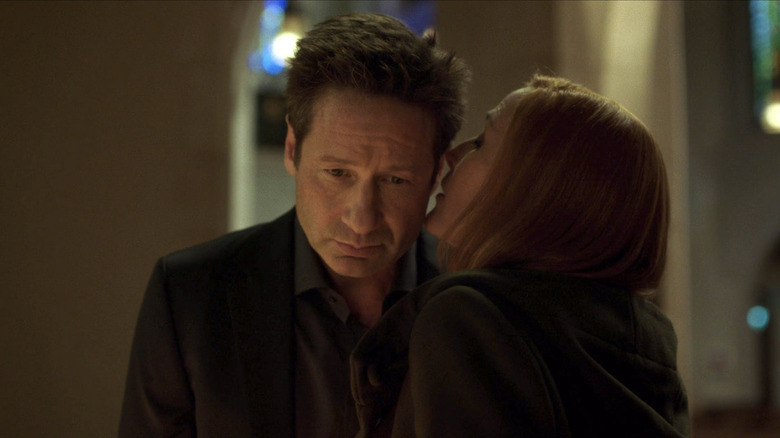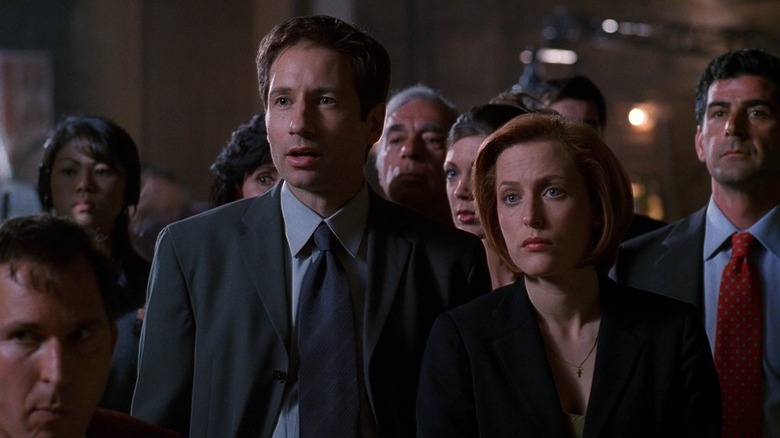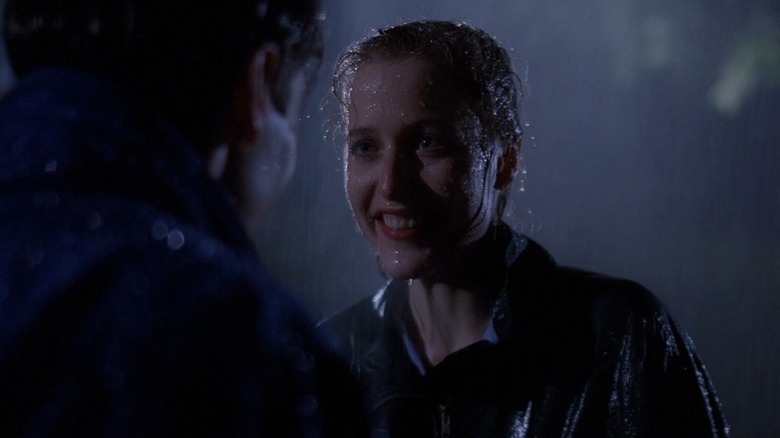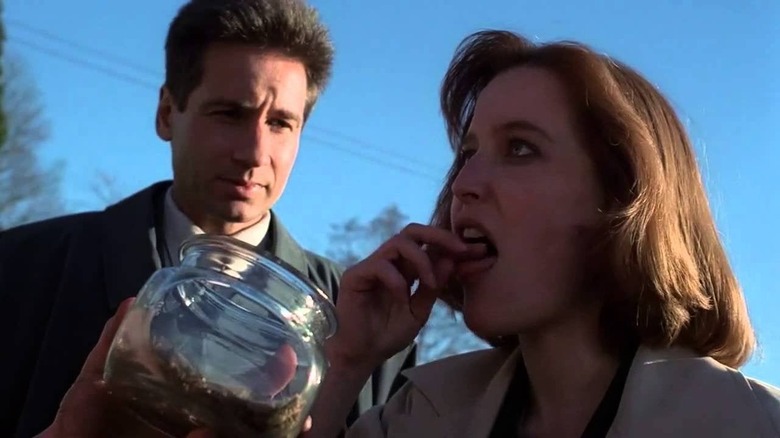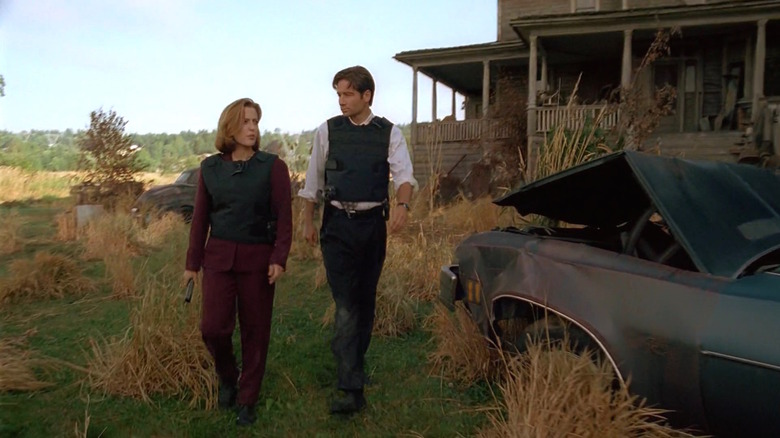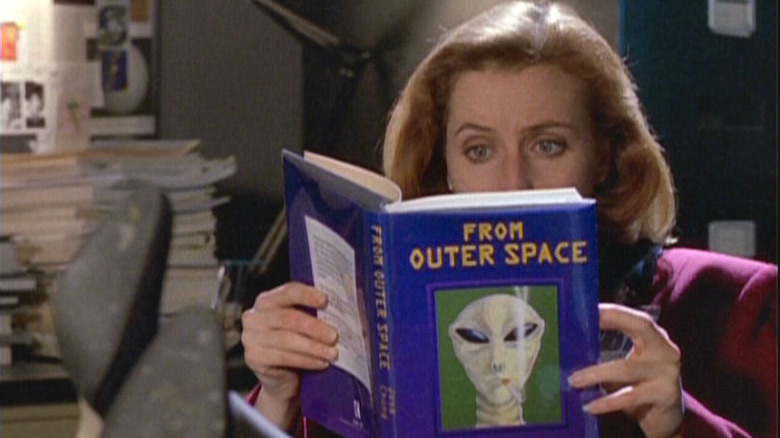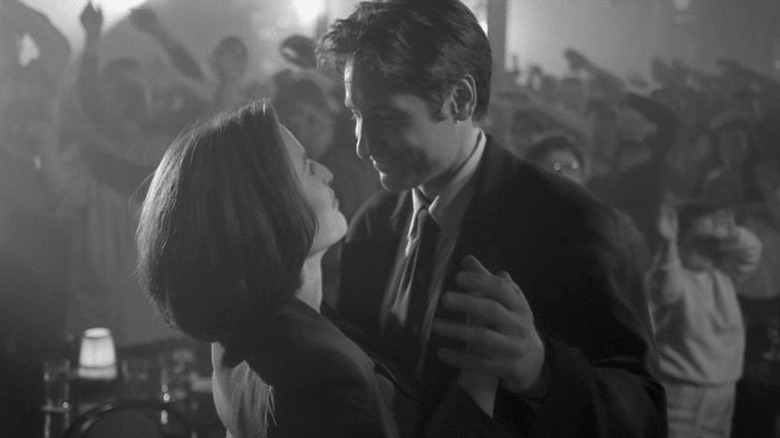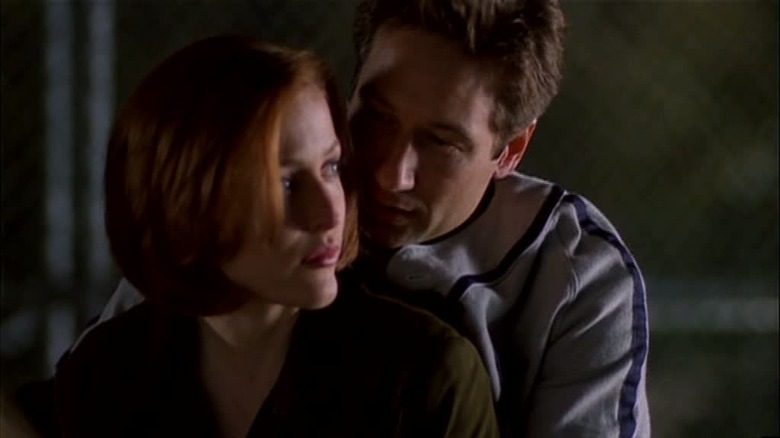Every X-Files Season Ranked From Worst To Best
One of the most beloved science fiction shows of all time, "The X-Files" has remained a huge part of our pop-cultural lexicon in the decades since its debut. With 217 episodes, two films, and a two-season reboot in 2016, there's so much there for fans — new and old — to revisit. There are so many iconic episodes, several not-so-great ones, and plenty of on-set drama, making "The X-Files" an incredibly rich piece of television that rewards fans who pay close attention.
Of course, even if you've seen every episode of the show, it's hard to remember all of the different plot points on the series, as outlandish as they often are. From aliens to monsters, to government conspiracies and dead babies, "The X-Files" was never afraid to go there, story-wise. The dramatic, confusing, often unspoken relationship between Scully and Mulder is another reason fans keep coming back for more, even though it was controversial during the show's original run.
Whether you're pro-Scully and Mulder or not (public opinion has certainly shifted in their favor since the show initially aired, despite what creator Chris Carter maintains), the show really has something for everyone. You might be jazzed up about the monsters, the government conspiracies, the devastating slow-burn semi-romance, or all of the above. Every season of the show contains hints of all these themes, but which seasons are superior? To answer this important question, we used a method even Scully would approve of: averaging the episode ratings for each season on IMDb. Discover our findings as we rank each season from worst to best. Beware: Spoilers lie ahead.
11. Season 10
We had such high hopes, and those hopes were decisively dashed when the first season of "The X-Files" reboot debuted in 2016. The first thing many fans noted was Scully's wig was ill-fitting, weirdly shaped, and decidedly not the right shade of red. But that wasn't even the worst of it. Season 10 was only 6 episodes long. As sometimes happened in the original series, it struggled to find a balance between the monster-of-the-week and "mytharch" episodes. It makes very little sense that, out of six episodes, only two relate to the larger subplot of the reboot, which isn't very interesting to begin with.
The monster-of-the-week episodes are the strongest episodes in the season, despite the fact that they're rather haphazardly placed within the larger narrative. The best episode of the season is "Mulder & Scully Meet the Were-Monster," which is a classic monster episode penned by veteran writer Darin Morgan that sees Mulder trying to prove the existence of a monster before Scully can discount him.
The main issue with the reboot is that there was really no compelling reason for the series to return, plot-wise, and creator Chris Carter squandered the opportunity to wrap up the story in an exciting, satisfying way. It's no wonder that the best episodes of the season weren't written by Carter. If the derivative season finale — in which it's revealed that the events of the season were basically a dream — is anything to go by, it's clear Carter had most certainly lost his mojo by this point.
10. Season 9
It's no surprise that Season 9 of "The X-Files" isn't high up on this list, as the show never quite recovered following Mulder's exit at the end of Season 7. The show's creators did their best to create interest for fans by bringing in Monica Reyes (Annabeth Gish) and John Doggett (Robert Patrick) as replacements, but it quickly became clear no one could replace the chemistry Scully and Mulder had. While Reyes and Scully had a compelling dynamic and Doggett actually became a fan favorite, it felt like the writers had given up on making something truly excellent by this point. Some fans were also upset with Scully's characterization this season.
The highest-rated episode of the season is the finale, in which Mulder returns, but it's mostly exciting because we've been missing him for so long. One of the most intriguing episodes in an otherwise lackluster season is "Release," in which we learn more about the murder of Doggett's son. Another highlight of the season is the guest appearance of Lucy Lawless, who starred as a super-soldier named Shannon McMahon. (Sadly, her appearance on the show was cut short due to her pregnancy.)
Despite these occasional bright spots, for most of the season, it felt like the writers had run out of ideas. It's fitting that this was the show's final season (until 2016, that is). If it wasn't clear before, Season 9 makes it clear that "The X-Files" just can't succeed without its dynamic duo.
9. Season 11
Season 11, the second season of "The X-Files" reboot, is only slightly better than Season 10. The main reason Season 11 slightly edges out Season 10 is that it has 10 episodes instead of 6, which means there is more time for the plot to be fleshed out. Unfortunately, the mythology plot of the season remains pretty unsatisfying. Like the previous season, the "My Struggle" episodes — which follow the conspiracy involving Mulder and Scully's son — are the worst of the season, and fail to conclude in a satisfying way.
It makes absolutely zero sense that the Smoking Man (William B. Davis) is still alive after the missile attack that burnt him alive at the end of Season 9. Most damningly, the premiere of Season 11 is undoubtedly one of the most offensive episodes of "The X-Files" ever written. With the return of the Smoking Man, we learn the truth of Scully's pregnancy: he, not Mulder, is the father of Scully's child. What's worse, he describes Scully's insemination as impregnation with science, which is a gross and unnecessary way to say he raped her. Despite her strength in the face of terrifying circumstances, Scully has long been a guinea pig for experimentation and violence, so it was extremely disheartening that Carter decided to continue this trend in the most upsetting way possible in Season 11.
Once again, because of Carter's misguided direction in the "My Struggle" episodes, the best episodes of the season are the monster-of-the-week ones that have nothing to do with whatever was going on with their superpowered son. A highlight of the season is "Rm9sbG93ZXJz," in which Scully and Mulder encounter technology gone wrong in a "Black Mirror"-like thought experiment, and "The Lost Art of Forehead Sweat," which is an intriguing exploration of the Mandela Effect.
8. Season 7
When it was announced that David Duchovny was going to be leaving "The X-Files" at the end of Season 7, fans were prepared for the worst. While Season 7 isn't terrible, fans were right to be worried. It marked the start of a decline in quality for the series, even prior to Mulder's official departure from the show. Because Duchovny was leaving, Carter decided to wrap up some series-long conspiracies, including what really happened to Mulder's sister, Samantha. In many ways, the season feels like an ending, so it's odd that the show continues for two more seasons.
Overall, the season is pretty rocky, with a mix of some clunkers and some gems. Despite an interesting premise, "First Person Shooter" fails to deliver the thrills it promises. On the other hand, "X-Cops," in which Scully and Mulder try to solve a mystery while being followed around by the "Cops" camera crew, does deliver on its unique premise. "Je Souhaite," in which the duo encounter a genie, is similarly exciting and something we hadn't seen tackled on the show before.
Despite that the fact that this season feels too self-referential at times, it does deliver one thing fans had long awaited: a kiss between Mulder and Scully. Technically, their first kiss was in the Season 6 episode "Triangle," but Scully wasn't actually Scully in that episode, so it doesn't count. Their true first kiss comes at the beginning of Season 7 in the episode "Millennium," when Scully and Mulder kiss on New Year's Eve 1999. The kiss itself isn't all that special, but it at least gave fans something to write home about.
7. Season 1
Let's be clear: "The X-Files" was good from the start. The pilot of the series is a total classic, and it's a treat to get to see Scully and Mulder first meet and the origin of their legendary dynamic. The only reason Season 1 is ranked so low is that the show continued to get better (apart from the last few seasons) as it went on, and Season 1 was only a precursor to that greatness.
While the season was a little uneven, it introduced us to the classic tone and witty banter of the show, as well as some great monsters of the week. The eerily malleable Eugene Tooms (Doug Hutchinson) is one of the greatest monsters in the entire series and terrifying to this day. Two great episodes of the season have to do with some horrifying creepy-crawlies: "Ice," which follows alien worms in Alaska, and "When Darkness Falls," in which Scully and Mulder investigate a swarm of glowing green bugs. The ever-watchable Brad Dourif also makes an appearance as a psychic inmate in "Beyond the Sea," an episode that also deepens Scully's backstory.
Season 1 also has some episodes that absolutely do not hold up (and probably never held up to begin with), most notably "Gender Bender," which follows a being that can change its gender at will. The idea to make the show racier was clearly ill-advised. Nonetheless, Season 1 does an admirable job of setting up the dynamic we've come to love and setting the scene for what's to come.
6. Season 8
It's become clear now that "The X-Files" simply isn't the same without both Mulder and Scully, though the show's writers and actors tried their very hardest to still make Season 8 worth watching. Much of the credit has to go to Gillian Anderson, whose performance as Scully is, as always, charming, complex, and endlessly watchable. Though fans initially had some trouble warming up to the new characters, they gradually warmed to Doggett. Sadly, Reyes remained critically underdeveloped (something that is no fault of the eternally underrated Annabeth Gish).
On the plus side, Season 8 saw the introduction of Adam Baldwin's super-soldier Knowle Rohrer (the precursor to Lucy Lawless' stint in Season 9), who made a compelling season-long antagonist. The first two episodes of the season ("Within" and "Without") are also fairly intriguing, especially because of the way they set up the new dynamic between Scully and Doggett. While Mulder and Scully used to fill the classic believer/skeptic dynamic, in this season we're introduced to a new dynamic: that of the skeptic and a woman who believes a little more than she used to. It's a fun role reversal, and despite the tragedy of Duchovny's exit, his disappearance does give the season a much-needed sense of propulsion.
5. Season 2
Following the energetic yet uneven freshman season of "The X-Files," Season 2 is where the series really started to find its footing. One of the most compelling aspects of the season is the mythology, which starts to get exciting. Following the intriguing introduction of Deep Throat (Jerry Hardin) in Season 1, the second season begins to delve more deeply into the vast conspiracy that Scully and Mulder find themselves in. Looking back, Season 2 set the scene mythology-wise for a lot of what comes later.
Despite Scully's absence for the first few episodes due to Anderson's pregnancy, the season is pretty solid throughout, and Duchovny is able to carry those episodes without her. The range of episodes in the second season — from hilarious and perplexing to downright terrifying — is impressive, and it's a satisfying one to watch all the way through. There are some really strong episodes in this season, including "Ascension" and "One Breath," in which Scully is kidnapped and Mulder must race to find her. (The episode that comes between these two, "3," which is about vampires, is significantly worse, but at least has a memorable setting of a forest-fire-ridden California.) "Soft Light" also featured one of the best guest stars of the series, Tony Shalhoub.
Importantly, Season 2 also introduces one of the all-time-best monsters in "The X-Files": the serial killer Donnie Pfaster (Nick Chinlund). Focusing on a human "monster" rather than something supernatural was a novel choice for the series, and it certainly paid off.
4. Season 4
Season 4 of "The X-Files" is one of the darkest seasons of the series, and it's also one of the best. For starters, the season features what is potentially the most disturbing episode in the entire show, "Home." It was so creepy that it was banned from television for years following its initial run. If you've somehow forgotten, the episode follows the Peacock family, a group of inbred brothers who live on a farm. The episode begins with the discovery of a dead, deformed baby buried in a baseball field to give you an indication of how scary it will be.
"Home" aside, the season is a near-perfect mix of mythology and monster-of-the-week episodes, a formula that only the best seasons of the show get right. Scully's cancer plot is especially compelling (and tragic), and also adds a feeling of urgency and desperation to the season as she and Mulder look for a cure. Moreover, Scully's illness brought her and Mulder closer together than ever before, even if their relationship remained "platonic" for another agonizing four years. "Memento Mori" is arguably one of the best episodes of the entire series, and gives us one of the most touching moments from the pair.
Season 4 also gives the audience more insight into the origins of the Smoking Man, as we learn his extra-secret history, including the fact that he was responsible for the assassination of JFK. "Paper Heart" is another highlight of the season, as we see Mulder confront John Lee Roche (Tom Noonan), who causes him to question what really happened to his sister.
3. Season 3
Season 3 is a near-perfect season of "The X-Files," so it's no surprise it's so high up on this list. Season 1 was good, Season 2 was great, and Season 3 is even better, so it's clear the writers were on a roll when they wrote this fateful season. Much of the mythology from this season stems from the events of Season 2 wherein Scully gets a chip implanted in her neck, and the conspiracy and intrigue is nonstop this season.
Season 3 earned the series five Emmys, and it's evident why. It's obvious that the writers had a clear idea of what the show was and where it was going this season, and both the mythology and monster-of-the-week episodes are incredible. Season 3 also features the episode "Clyde Bruckman's Final Repose," which is often called one of the best — if not the best – episodes of "The X-Files" of all time. (It's also the episode that won writer Darin Morgan an Emmy.) As opposed to a typical "X-Files" episode that deals with the monstrous or the alien, this episode is much more existential and sees Mulder and Scully teaming up with Clyde Bruckman (played by the legendary Peter Boyle), who has visions of people's deaths. It's tightly written, perfectly executed, and a wonderful example of just how brilliant the show can be. "D.P.O.," which follows a moody teenager who can control lightning, is another episode with plenty of personality.
There's really only one clunker in the whole season, but unfortunately, it's a pretty big one. "Teso dos Bichos" is probably the worst episode of the whole series, so it's a shame it comes in such an excellent season. As the story goes, the cast and crew hated the episode so much that Director Kim Manners made t-shirts that said "Teso Dos Bichos Survivor" for everyone to wear. Ouch!
2. Season 5
Season 5 sits near the top of this list because it has several fan-favorite monsters of the week. One of the highest-rated episodes in the entire series is "Bad Blood," which is a hilarious episode that illustrates that "The X-Files" can do funny just as well as it can do scary. The episode begins with an incredible cold open in which Mulder stakes a teenager he believed to be a vampire, only to discover a set of fake fangs in the unfortunate kid's mouth.
"The Post-Modern Prometheus" is another classic episode in which Mulder and Scully investigate a "monster" who is obsessed with Cher. Though Chris Carter sadly wasn't able to pull off the Cher cameo that he wanted, the black-and-white episode is still one of the best episodes of the series. The first two episodes of the Season also follow Mulder's search to find a cure for Scully's illness, a plotline that remains one of the most compelling (and heart-wrenching) of the whole series.
Season 5 also contains one of the best Scully/Mulder moments in the entire show. In "Folie à Deux," the penultimate episode of the season, Mulder is trapped in the hospital because the doctors don't believe he's being hunted by a huge insect monster (classic). Pleading with Scully to listen to him, he tells her, "Scully, you have to believe me. Nobody else on this whole damn planet does or ever will. You're my one in 5 billion." It's a beautiful encapsulation of their whole dynamic, even if their romantic relationship is still technically subtextual at this point.
1. Season 6
One of the most notable things about Season 6 of "The X-Files" is the fact that production moved from Vancouver to LA at the beginning of this season. This means we see much more of the actual desert, rather than British Columbia made up to look like New Mexico.
Scenic differences aside, Season 6 contains some very highly rated episodes, which is why it clinches the top spot on this list. The season follows the events of the 1998 film and sees Mulder and Scully banished from the X-Files and given other duties instead. Of course, Mulder and Scully ignore these orders and continue investigating on their own. Season 6 is also an important one for shippers, as it features the iconic baseball scene at the end of "The Unnatural."
There are a ton of great episodes in this season, including "Dreamland" and "Dreamland II" in which Mulder and Scully travel to Area 51, and "Field Trip," where Mully and Sculder are exposed to a flesh-eating hallucinogenic. Another notable episode is "Triangle," in which Mulder is trapped in a WWII ship in the Bermuda triangle and encounters a 1940s version of Scully. (This episode technically includes another kiss, but we'd argue it doesn't count because Scully isn't actually Scully.) "Arcadia," in which Mulder and Scully go undercover as a suburban married couple, and "How The Ghosts Stole Christmas," in which the duo gets trapped in a haunted house inhabited by Lily Tomlin and Ed Asner, are also highlights.
While the show's central mythology became increasingly convoluted during this season, some truly incredible monster-of-the-week episodes and tons of quality moments between Mulder and Scully make Season 6 a winner.
